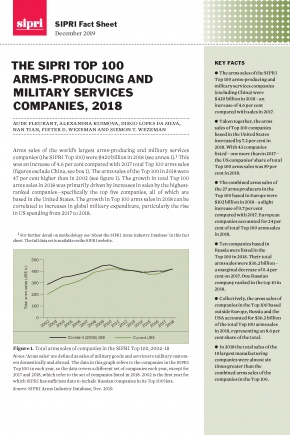
2018年SIPRI武器生产和军事服务百强企业
全球100家最大的武器生产和军事服务公司(SIPRI百强)的军火销售
2018年为4200亿美元。
与2017年百大武器销售总额相比,增长了4.6%
、SIPRI
Arms sales worldwide up nearly 5%, says new report
The turnover of the 100 biggest arms manufacturers came to $420 billion, thanks in large part to the US market, said the report.
US manufacturers alone accounted for 59% of the market, or a turnover of $246 billion, up 7.2% on the previous year.
“This is a significant increase over one year considering the already high levels of US combined arms sales,” Aude Fleurant, the director of SIPRI’s arms transfers and military expenditure programme, told AFP.
US firms
were benefitting from the Trump administration’s decision to modernise its armed services to reinforce its position against China and Russia.
Russia
was second in the rankings for arms production, with 8.6% of the market, just ahead of the United Kingdom on 8.4% and France on 5.5%.
The study did not include China, for which there was insufficient data, but SIPRI’s research estimated that there were between three and seven Chinese businesses in the top 100 arms manufacturers.
Two major European companies, Airbus and MBDA were also responding to “demand due to ongoing armed conflicts and severe tensions in several regions”, Fleurant added.
China has spent 1.9% of its gross domestic product on defence every year since 2013.
The top-ranked Russian firm, Almaz-Antei, jumped to ninth on the list with turnover of $9.6 billion – 18% up on the previous year.
“This increase was based not only on strong domestic demand, but also on continuing growth in arms sales to other countries, in particular exports of the S-400 air defence system,” said the report.
One of the buyers of this system is NATO member Turkey, which took the deal despite a US threat of sanctions.
Turkey’s arms industry had two businesses in the top 100 and turnover of $2.8 billion, up 22% on the previous year.
The world’s largest arms maker remains the US firm Lockheed Martin, as it has been since 2009, this last year with turnover of $47.3 billion.
Its sales alone account for 11% of the world market.
EURACTIV.com